Learn How To Have A Happy New Year, Every Year
Nurse Next Door Co-CEO Amber Biesse shares lessons from the Happiness Experts to help unleash the Power Of Happier Ageing in 2020
“Happiness depends on ourselves.”
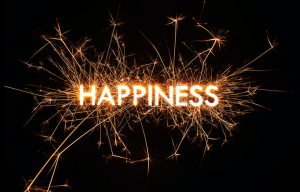
Searching for the answer to happiness is not new. Humans have been documenting the pursuit of happiness for nearly 2,500 years. Each year, as one year draws to a close and another prepares to unfold, millions of people around the world wish each other a “Happy New Year!”
Happiness, and the ability to care for ourselves in a way that satisfies our emotions and provides us with a sense of purpose, has fascinated philosophers and psychologists for centuries, not the least of whom: Confucius, Buddha, Socrates, Aristotle, are still influencing the way we view and learn how we can have a happy new year, every year.
At Nurse Next Door the concept of happiness is one of the fundamental values that underpin our philosophy of care. We believe in it so much we registered the phrase Happier Ageing.
As we head into another new year, Co-CEO and Founder of Nurse Next Door Australia, Amber Biesse, shares what happiness means to her, and how she and partner and Co CEO Matt Fitton are making happiness in aged care and disability support their number one priority.
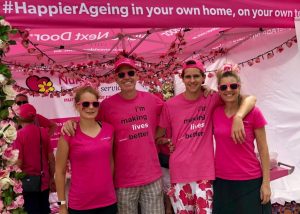
One of the greatest misunderstandings around home care, aged care and disability support is this idea that we have to trade happiness for care. That you can’t have both. This of course is not true. Scientists and psychologists have confirmed that happiness, lies in our hands. At Nurse Next Door we make happiness the focus of our home care. Our caregivers’ priority, every day, is to do the little things that bring joy to their clients
Defining Happiness
The most important job our caregivers have is to find out what happiness means to each of their clients. Obviously, it’s different for everyone. The common thread, however, is the idea that happiness is defined through our actions. If you go back as far as the fourth century B.C. Confucius believed, like many philosophers, psychologists and scientists after him, that the key to positive thinking is positive action.
“I hear and I forget. I see and I remember. I do and I understand.”
There’s a fun blog by the Pursuit Of Happiness that asks Confucius to explain this theory of happiness further. He likens it to riding a bicycle. If you don’t keep moving, if there’s no action, you’re bound to wobble and most probably fall off. Moving from point A to point B, from unhappiness to happiness requires you to keep moving forward.
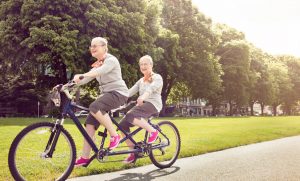
At Nurse Next Door we simply ask our clients what they love doing that they no longer do then we find ways to make that a part of their home care plan. From swimming to poetry, gardening to travelling, shopping to flying, our caregivers look for ways to keep their clients chasing their dreams, no matter the hurdles or challenges to do so.
Use What You’ve Got
Another great philosopher, Socrates, defined happiness as not what we have, but how we use it. Take money for instance. In the wrong hands, a person who believes money will make them happy but doesn’t know how to use money wisely, will simply lose it, and likely be unhappy. This idea has been supported by happiness theorists through the ages, including Dr Martin Seligman who noted that “good character” is closely linked to our happiness. Famous for challenging psychologists to study “what makes happy people happy”, Seligman says we hold the power to shape our own happiness.
Neurologist, psychiatrist and holocaust survivor Viktor Frankl studied the same idea – that we can always find meaning, and happiness in a situation, even if it seems otherwise. He tells the story of a patient, an elderly man, who was severely depressed following the death of his wife. He felt he couldn’t get past it. Frankl pointed out to him that the alternative was the gentleman’s wife outliving him and suffering as he was. The gentleman was then able to realise that he could find a small sense of meaning in knowing his wife did not have to live with the suffering and pain that he was now experiencing, which gave him peace of mind.
Arguably one of the greatest thinkers, Aristotle proposed that happiness is not something that can be gained or lost in a few hours, like pleasurable sensations. Happiness is a culmination of moments throughout life. For this reason Happier Ageing is something we practice every day with our clients.
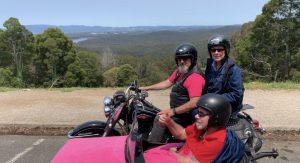
It’s also important to realise that the likelihood of never being unhappy is very low. After all, how do you know you are happy if you’ve never been unhappy? Socrates, Epicurus, Buddha and Tolle all agree that feelings, such as happiness or pleasure, are only relative to their counterpart. In other words, you can’t have one without the other.
Focusing On What Matters
In 1987 Abraham Maslow presented us with the idea that there is a hierarchy of needs, moving from the necessary: breathing, sleeping, eating through to those which allow us to achieve self-actualisation: morality, creativity, acceptance of others.
Coining the phrase “positive psychology” upon which we now build our philosophy of care and Happier Ageing, Maslow explored the relationship between happiness, positivity, and the order of our needs. Without physiological needs being met – air to breathe, food and water to sustain us, we cannot focus on safety, followed by love and belonging, and so on. Maslow says we cannot achieve the highest level of psychological well being – a true happiness – if we are struggling to remain healthy, or feel unsafe. The beauty of having a care at home is that our clients’ health and safety is taken care of, so they can focus on the things that matter.
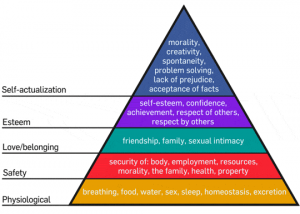
Here and Now
This is a lesson I’ve taken from Buddha, whose teachings encourage us to live in the here and now and experience the world around us. No excuses. You should never be “too busy”, “too old” or “too tired” to catch up with friends and family. Buddha’s teachings say achieving a state of “transcendent bliss and well-being” is the result of being able to enjoy things as they really are.
When faced with physical or cognitive challenges, whether the result of disability or age, even in the highest levels of care, we encourage our clients to keep pushing the limits of their care plan. Sometimes the tough moments help us see what we are truly capable of. At the very least they present a moment to honour that which is lost.
We encourage clients to do less things in the day so they have time to savour a good experience.
- Does it really matter if it takes twice as long to walk the dog because you walk a little slower now? Walk slowly and enjoy the time with your pet.
- What’s more important – cleaning the house or having coffee with an old friend? A home care plan should include light housekeeping duties so you have time for friends and family, and they don’t have to clean when they drop round.
Too often care becomes task-focused and clinical as nurses and caregivers are pressed for time. The beauty of home care is that it’s just about one client, in their own home, setting the terms for their care. Of course there may be specific medical needs that have to be addressed, but the client still retains the power to determine when and where they will receive care, and how they will fill their days. Want to have a bubble bath at 4pm – no problem. Dinner and a movie with friends – we’ll bring the movie to you, perhaps on a big screen in the garden with a BBQ dinner prepared by your caregiver.
We hear from daughters, sons, friends, family and clients themselves that their biggest concern around organising care is their ability to maintain a sense of self and to experience happiness. With additional assistance around the home, they find greater independence. Daughters can get back to being daughters with the peace of mind that mum or dad is in safe hands. Clients have someone on hand to help them achieve the things that make them happy. That’s the Power of Happier Ageing.
If you or a loved one needs help to have a Happy New Year, contact Nurse Next Door today on 1300 600 247 to organise an obligation-free Caring Consult. Our Care Services Team are on hand 24/7, 365 days of the year to help you unlock the Power of Happier Ageing, and enhance your wellbeing every day of the year.
